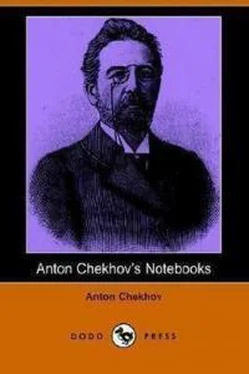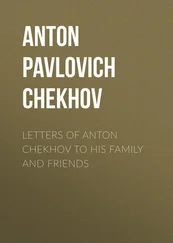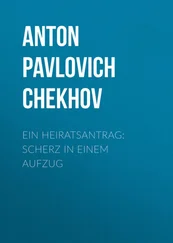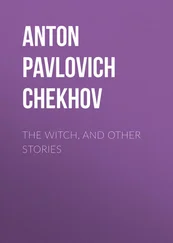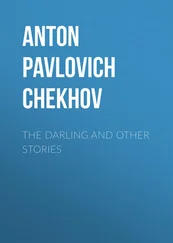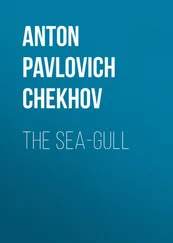Антон Чехов - Notebooks of Anton Chekhov
Здесь есть возможность читать онлайн «Антон Чехов - Notebooks of Anton Chekhov» весь текст электронной книги совершенно бесплатно (целиком полную версию без сокращений). В некоторых случаях можно слушать аудио, скачать через торрент в формате fb2 и присутствует краткое содержание. Год выпуска: 2014, Издательство: epubBooks Classics, Жанр: Биографии и Мемуары, на английском языке. Описание произведения, (предисловие) а так же отзывы посетителей доступны на портале библиотеки ЛибКат.
- Название:Notebooks of Anton Chekhov
- Автор:
- Издательство:epubBooks Classics
- Жанр:
- Год:2014
- ISBN:нет данных
- Рейтинг книги:4 / 5. Голосов: 1
-
Избранное:Добавить в избранное
- Отзывы:
-
Ваша оценка:
- 80
- 1
- 2
- 3
- 4
- 5
Notebooks of Anton Chekhov: краткое содержание, описание и аннотация
Предлагаем к чтению аннотацию, описание, краткое содержание или предисловие (зависит от того, что написал сам автор книги «Notebooks of Anton Chekhov»). Если вы не нашли необходимую информацию о книге — напишите в комментариях, мы постараемся отыскать её.
Notebooks of Anton Chekhov — читать онлайн бесплатно полную книгу (весь текст) целиком
Ниже представлен текст книги, разбитый по страницам. Система сохранения места последней прочитанной страницы, позволяет с удобством читать онлайн бесплатно книгу «Notebooks of Anton Chekhov», без необходимости каждый раз заново искать на чём Вы остановились. Поставьте закладку, и сможете в любой момент перейти на страницу, на которой закончили чтение.
Интервал:
Закладка:
* * * * *
Why did Hamlet trouble about ghosts after death, when life itself is haunted by ghosts so much more terrible?
* * * * *
Daughter : "Felt boots are not the correct thing."
Father : "Yes they are clumsy, I'll have to get leather ones." The father fell ill and his deportation to Siberia was postponed.
Daughter : "You are not at all ill, father. Look, you have your coat and boots on…."
Father : "I long to be exiled to Siberia. One could sit somewhere by the Yenissey or Obi river and fish, and on the ferry there would be nice little convicts, emigrants…. Here I hate everything: this lilac tree in front of the window, these gravel paths…."
* * * * *
A bedroom. The light of the moon shines so brightly through the window that even the buttons on his night shirt are visible.
* * * * *
A nice man would feel ashamed even before a dog….
* * * * *
A certain Councillor of State, looking at a beautiful landscape, said: "What a marvelous function of nature!" From the note–book of an old dog: "People don't eat slops and bones which the cooks throw away. Fools!"
* * * * *
He had nothing in his soul except recollections of his schooldays.
* * * * *
The French say: "Laid comme un chenille"—as ugly as a caterpillar.
* * * * *
People are bachelors or old maids because they rouse no interest, not even a physical one.
* * * * *
The children growing up talked at meals about religion and laughed at fasts, monks, etc. The old mother at first lost her temper, then, evidently getting used to it, only smiled, but at last she told the children that they had convinced her, that she is now of their opinion. The children felt awkward and could not imagine what their old mother would do without her religion.
* * * * *
There is no national science, just as there is no national multiplication table; what is national is no longer science.
* * * * *
The dog walked in the street and was ashamed of its crooked legs.
* * * * *
The difference between man and woman: a woman, as she grows old gives herself up more and more to female affairs; a man, as he grows old, withdraws himself more and more from female affairs.
* * * * *
That sudden and ill–timed love–affair may be compared to this: you take boys somewhere for a walk; the walk is jolly and interesting—and suddenly one of them gorges himself with oil paint.
* * * * *
The character in the play says to every one: "You've got worms." He cures his daughter of the worms, and she turns yellow.
* * * * *
A scholar, without talent, a blockhead, worked for twenty–four years and produced nothing good, gave the world only scholars as untalented and as narrow–minded as himself. At night he secretly bound books—that was his true vocation: in that he was an artist and felt the joy of it. There came to him a bookbinder, who loved learning and studied secretly at night.
* * * * *
But perhaps the universe is suspended on the tooth of some monster.
* * * * *
Keep to the right, you of the yellow eye!
* * * * *
Do you want to eat? No, on the contrary.
* * * * *
A pregnant woman with short arms and a long neck, like a kangaroo.
* * * * *
How pleasant it is to respect people! When I see books, I am not concerned with how the authors loved or played cards; I see only their marvelous works.
* * * * *
To demand that the woman one loves should be pure is egotistical: to look for that in a woman which I have not got myself is not love, but worship, since one ought to love one's equals.
* * * * *
The so–called pure childlike joy of life is animal joy.
* * * * *
I cannot bear the crying of children, but when my child cries, I don't hear.
* * * * *
A schoolboy treats a lady to dinner in a restaurant. He has only one rouble, twenty kopecks. The bill comes to four roubles thirty kopecks. He has no money and begins to cry. The proprietor boxes his ears. He was talking to the lady about Abyssinia.
* * * * *
A man, who, to judge from his appearance, loves nothing but sausages and sauerkraut.
* * * * *
We judge human activities by their goal; that activity is great of which the goal is great.
* * * * *
You drive on the Nevski, you look to the left on the Haymarket; the clouds are the color of smoke, the ball of the setting sun purple—Dante's hell!
* * * * *
His income is twenty–five to fifty thousand, and yet out of poverty he shoots himself.
* * * * *
Terrible poverty, desperate situation. The mother a widow, her daughter a very ugly girl. At last the mother takes courage and advises the daughter to go on the streets. She herself when young went on the streets without her husband's knowledge in order to get money for her dresses; she has some experience. She instructs her daughter. The latter goes out, walks all night; not a single man takes her; she is ugly. A couple of days later, three young rascals on the boulevard take her. She brought home a note which turned out to be a lottery ticket no longer valid.
* * * * *
Two wives: one in Petersburg, the other in Kertch. Constant rows, threats, telegrams. They nearly reduce him to suicide. At last he finds a way: he settles them both in the same house. They are perplexed, petrified; they grow silent and quiet down.
* * * * *
His character is so undeveloped that one can hardly believe that he has been to the University.
* * * * *
And I dreamt that, as it were, what I considered reality was a dream, and the dream was reality.
* * * * *
I observed that after marriage people cease to be curious.
* * * * *
It usually takes as much time to feel happy as to wind up one's watch.
* * * * *
A dirty tavern near the station. And in every tavern like that you will find salted white sturgeon with horse radish. What a lot of sturgeon must be salted in Russia!
* * * * *
Z. goes on Sundays to the Sukharevka (a market–place in Moscow) to look for books; he finds a book, written by his father, with the inscription: "To darling Nadya from the author."
* * * * *
A Government official wears on his chest the portrait of the Governor's wife; he feeds a turkey on nuts and makes her a present of it.
* * * * *
One should be mentally clear, morally pure, and physically tidy.
* * * * *
It was said of a certain lady that she had a cat's factory; her lover tortured the cats by treading on their tails.
* * * * *
An officer and his wife went to the baths together, and both were bathed by the orderly, whom they evidently did not consider a man.
* * * * *
"And now he appeared with all his decorations."
"And what decorations has he got?"
"He has a bronze medal for the census of 1897."
* * * * *
A government clerk gave his son a thrashing because he had only obtained five marks in all his subjects at school. It seemed to him not good enough. When he was told that he was in the wrong, that five is the highest mark obtainable, he thrashed his son again—out of vexation with himself.
* * * * *
A very good man has such a face that people take him for a detective; he is suspected of having stolen shirt–studs.
* * * * *
A serious phlegmatic doctor fell in love with a girl who danced very well, and, to please her, he started to learn a mazurka.
* * * * *
The hen sparrow believes that her cock sparrow is not chirping but singing beautifully.
* * * * *
When one is peacefully at home, life seems ordinary, but as soon as one walks into the street and begins to observe, to question women, for instance, then life becomes terrible. The neighborhood of Patriarshi Prudy (a park and street in Moscow) looks quiet and peaceful, but in reality life there is hell.
Читать дальшеИнтервал:
Закладка:
Похожие книги на «Notebooks of Anton Chekhov»
Представляем Вашему вниманию похожие книги на «Notebooks of Anton Chekhov» списком для выбора. Мы отобрали схожую по названию и смыслу литературу в надежде предоставить читателям больше вариантов отыскать новые, интересные, ещё непрочитанные произведения.
Обсуждение, отзывы о книге «Notebooks of Anton Chekhov» и просто собственные мнения читателей. Оставьте ваши комментарии, напишите, что Вы думаете о произведении, его смысле или главных героях. Укажите что конкретно понравилось, а что нет, и почему Вы так считаете.
